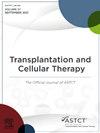在真实的临床环境中,对发热性中性粒细胞减少症自体干细胞移植患者的抗生素降级进行评估。
IF 3.6
3区 医学
Q2 HEMATOLOGY
引用次数: 0
摘要
背景:发热性中性粒细胞减少症(FN发热性中性粒细胞减少症(FN)是约90%自体干细胞移植(SCT)患者的并发症。指南支持早期使用广谱抗生素(BSA),以预防发病率和死亡率。然而,对于临床病情稳定、发热原因不明的患者,BSA的最佳持续时间尚不清楚。不断积累的证据表明,对特定患者减量使用 BSA 可能会缩短 BSA 的暴露时间,而不会影响感染、反复发热和再次入院等临床结果。为此,范德比尔特大学医学中心(VUMC)实施了一项降级方案,以确定哪些自体 SCT 患者可从早期降级 BSA 中获益:本研究旨在分析早期经验性抗生素降级对 BSA 持续时间的影响,以及对自体 SCT 患者复发发热和有记录感染发生率的影响:这是一项单中心回顾性研究,评估了2018年1月至2022年12月期间在VUMC接受自体SCT并发生FN的18岁以上患者(N = 195)。该方案于 2020 年 1 月 1 日启动,目的是将确定为不明原因发热的稳定型中性粒细胞减少患者的 BSA 降为预防性治疗。主要结果是 30 天内 BSA 的天数。次要临床结果包括复发发热、有记录的感染、再次入院、30 天死亡率和 90 天非复发死亡率 (NRM)。采用Wilcoxon秩和检验、Pearson卡方检验或回归分析(视情况而定)比较方案实施前和实施后两组的结果:结果:方案前组和方案后组的中位 BSA 持续时间分别为 4.7 天和 2.7 天(P与方案前组相比,对发生 FN 的自体 SCT 患者实施早期降级方案与缩短 BSA 持续时间有关,但在再入院、复发发烧和有记录的感染方面没有显著差异。这项研究补充了现有的证据,即对发热原因不明但无发热且临床病情稳定的 FN 患者及早解除 BSA 是安全的,并能减少不必要的抗生素使用。本文章由计算机程序翻译,如有差异,请以英文原文为准。
Evaluating Antibiotic De-escalation for Autologous Stem Cell Transplant Patients With Febrile Neutropenia in a Real-World Clinical Setting
Febrile neutropenia (FN) is a complication in approximately 90% of autologous stem cell transplant (SCT) patients. Guidelines support early broad-spectrum antibiotics (BSA) to prevent morbidity and mortality. However, in patients who are clinically stable and deemed to have a fever of unknown origin, the optimal duration of BSA is unknown. Accumulating evidence suggests that de-escalation of BSA in select patients may decrease duration of BSA exposure without compromising clinical outcomes such as infection, recurrent fever, and readmission. With this, a de-escalation protocol was implemented at Vanderbilt University Medical Center (VUMC) to identify autologous SCT patients who may benefit from early de-escalation of BSA. The objectives of this study were to analyze the impact of early empiric antibiotic de-escalation on the duration of BSA as well as its impact on the incidence of recurrent fever and documented infection in autologous SCT patients. This was a single-center, retrospective study evaluating patients older than 18 years of age who underwent autologous SCT and experienced an episode of FN from January 2018 to December 2022 at VUMC (N = 195). The protocol was initiated on January 1, 2020, to de-escalate BSA back to prophylaxis in stable neutropenic patients determined to have a fever of unknown origin. The primary outcome was the number of BSA days within 30 days. Secondary clinical outcomes included recurrent fever, documented infection, readmission, 30-day mortality, and 90-day non-relapsed mortality (NRM). Outcomes were compared across pre- and postprotocol groups with a Wilcoxon rank sum test, Pearson chi-square test, or regression analysis as appropriate. The median BSA duration was 4.7 and 2.7 days in the pre- and postprotocol groups, respectively (P < .001). Recurrent fever (14.2% versus 16.0%, P = .726), documented infection (1.7% versus 6.7%, P = .068), and readmission (13.3% versus 22.7%, P = .091) within 30 days were not significantly different between the two groups. Neither 30-day mortality (0.8% versus 1.3%, P = .736) nor 90-day NRM (0.8% versus 1.3%, P = .736) differed. The implementation of an early de-escalation protocol for autologous SCT patients who develop FN was associated with a reduction in duration of BSA compared to the preprotocol group without a significant difference in readmission, recurrent fevers, and documented infections. This study adds to existing evidence that early de-escalation of BSA in FN patients with a fever of unknown origin who are afebrile and clinically stable is safe and reduces unnecessary antibiotic use.
求助全文
通过发布文献求助,成功后即可免费获取论文全文。
去求助
来源期刊

Transplantation and Cellular Therapy
Medicine-Hematology
CiteScore
7.00
自引率
15.60%
发文量
1061
审稿时长
51 days
 求助内容:
求助内容: 应助结果提醒方式:
应助结果提醒方式:


